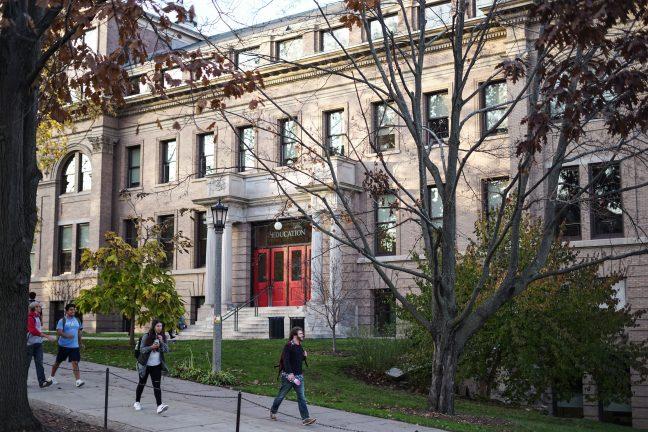As the demand for health education workers is predicted grow exponentially in the coming years, University of Wisconsin hopes to contribute well-prepared graduates with the approval of the new undergraduate health promotion and health equity degree.
The major will launch in Fall 2019 with plans to supply communities with graduates who are not only ready to promote health, but also to advocate for inclusion in health care.
Department of Kinesiology Chair Gary Diffee said the major will be housed in the School of Education’s Department of Kinesiology, however, this is a unique major in that it is a collaboration between three School of Education departments.
Madison barbershop works to make health education more accessible for men of color
The core coursework of Health Promotion, Health Equity is a combination of kinesiology, counseling psychology, rehabilitation psychology and special education, among other broad possible electives.
Department of Kinesiology undergraduate program coordinator Morgan Shields noted that this major makes for both a good double-major or stand-alone major. She said it will be easy to tailor coursework to students’ specific areas of interest and career goals.
“The flexibility, breadth and potential for widening that lens even further is something the students will hopefully really appreciate,” Shields said.
Diffee said that kinesiologists like himself often think about exclusively biological health, but he has started to consider that it may be time to think about why simply telling people they need exercise more is not an effective method for improving health.
Educators and health professionals must start to ask themselves what barriers — psychological, emotional, cultural — are causing their administration of healthcare to be ineffective for some people, Diffee said.
Mental health awareness education must be required for all students in health care
“I’m excited to take the holistic view of health to address some of those fundamental issues that any one piece of that cannot address by themselves,” Diffee said. “The uniting of these three departments will allow us to address health from all of those different aspects. I think we’re going to end up training students that are really competent to think about health in the most broad sense.”
UW student Hanna Kremsreiter is planning to go into nursing, but she is also looking into the HPHE major now.
“I think that this major will provide me with a lot of helpful information that will help me to be a better advocate for my future patients,” Kremsreiter said. “I also am really drawn to the equity part of the major because there are so many disparities in our healthcare system. I think that it is neat that I will have this knowledge to put into practice later on in my career.”
Growing job demand in health education fields has spurred student interest in health-related majors.
In the most recent first destination survey, 12 percent of undergraduates at UW entered health-related professions.
One of the reasons Diffee and his colleagues moved forward with the program is that there is currently no degree on the UW campus that trains students at the undergraduate level to specifically work in the health education arena — or even a Bachelor’s degree with the word “health” in the title.
UW looks to create ‘educational pipelines’ for students interested in health care
Diffee said one of the main goals of the program is to provide a pathway for people, specifically underrepresented and minority students, who are passionate and interested in working in health but are not in a position or have the desire to go into further training after their undergraduate studies.
Racial and ethnic minorities are significantly underrepresented in health professions, despite research showing that diversity is important in healthcare and in health education environments.
While the health promotion half of the major focuses on promoting health in various ways, the other half of the major, health equity, is a unique aspect of the program that recognizes that health education is going to look different among different populations of people, for example, rural versus urban and in different minority groups, Diffee said.
“The way [different groups of people are] going to receive health information is going to be very different, so we want to be sure that we are training our students to be able to communicate to a wide variety of different populations,” Diffee said. “We really are interested in not just promoting health behaviors in one particular cultural group, but making sure there is equitable access to that health information across society.”
School of Education launches new program aimed at fostering productive discussion
Diffee said health education jobs can come in many different forms, and job prospects for students graduating with this degree are in high demand right now.
Currently the School of Education is working on getting the word out about the new major to prospective students.
Diffee said they are specifically looking at students who are attending Student Orientation Advising and Registration, where there are more students that identify interest in health-related careers than anything else.
“I think [the combination of departments] brings in components that are often overlooked, and may be the big contributors to health in general,” Shields said. “There is going to be some exciting opportunities for collaboration that you wouldn’t know if you were just one of those majors.”













